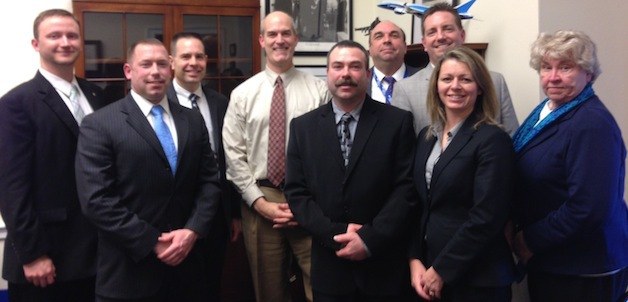WASHINGTON, D.C. — Marysville Mayor Jon Nehring and Marysville City Council members joined other Washington state officials, as part of an estimated 2,000 local leaders from across the country, at the annual Congressional City Conference from March 8-12 in Washington, D.C.
The Congressional City Conference is the annual legislative meeting of the National League of Cities, designed to inform municipal leaders about federal policy issues while providing an opportunity for city leaders to bring local concerns to their federal elected officials.
Along with interacting with fellow local officials during the conference and attending policy board meetings, the Marysville contingent also spent valuable time with the area’s Congressional delegation, including Senators Patty Murray and Maria Cantwell, and 2nd District Congressman Rick Larsen.
City officials shared their priorities, including large-scale transportation infrastructure investments too big to fund at the local level, and other capital funding needs. Marysville officials keyed in first on the Interstate 5 and State Route 529 interchange expansion project, to build new on- and-off ramps further south of Marysville, to reduce congestion and enable traffic to avoid the at-grade railroad crossing on Fourth Street downtown.
They also asked federal and state agencies to explore mitigation for negative impacts caused by increased coal train activity in the event of new coal terminal construction, keeping in mind the need for steady freight mobility important to commerce, economic development and jobs.
The Marysville officials further sought help with funding to convert the I-5/156th Street overcrossing to a full interchange, with on- and off-ramps, noting that the initial project to complete the overcrossing was funded through a public-private partnership with property owners.
“The Congressional delegation appreciated that we are doing our part at the local level to fund initial planning and engineering of these important projects, and that, through the proposed Transportation Benefit District measure to go before voters on the April 22 ballot, we are seeking local options to take care of street preservation and other smaller projects that we can manage at the local level,” Nehring said.
Beyond transportation-related issues, the Marysville contingent also expressed the need for capital funding tied to aquatic recreation, trail funding and public access in the Qwuloolt Estuary Restoration Project, underway by the Tulalip Tribes and a host of state and federal agencies.
Marysville officials also thanked the Washington delegation for Community Development Block Grant funding that is benefitting Marysville’s senior citizens in need of minor home repairs, as well as a food bank backpack program that provides weekend meals to students in need during the school year, domestic violence advocacy services, and the Comeford Park Spray Park that is nearing construction and slated for completion this summer.



